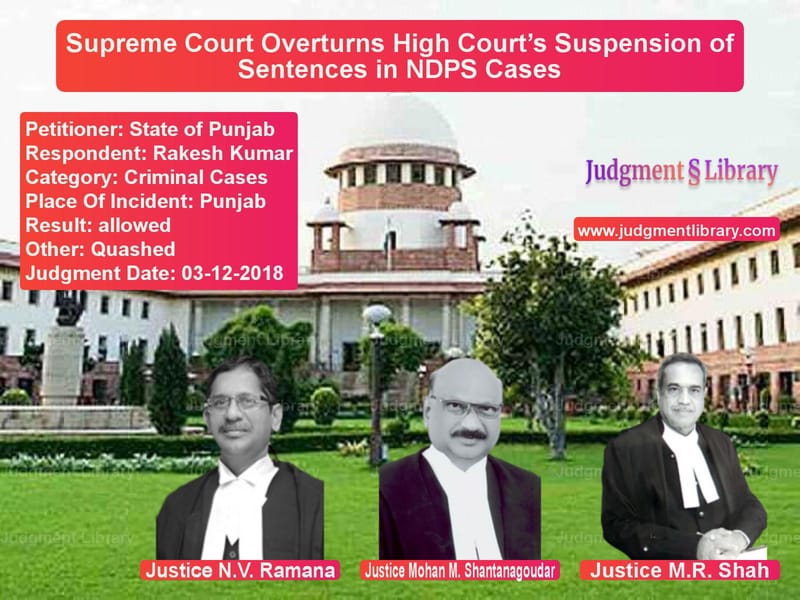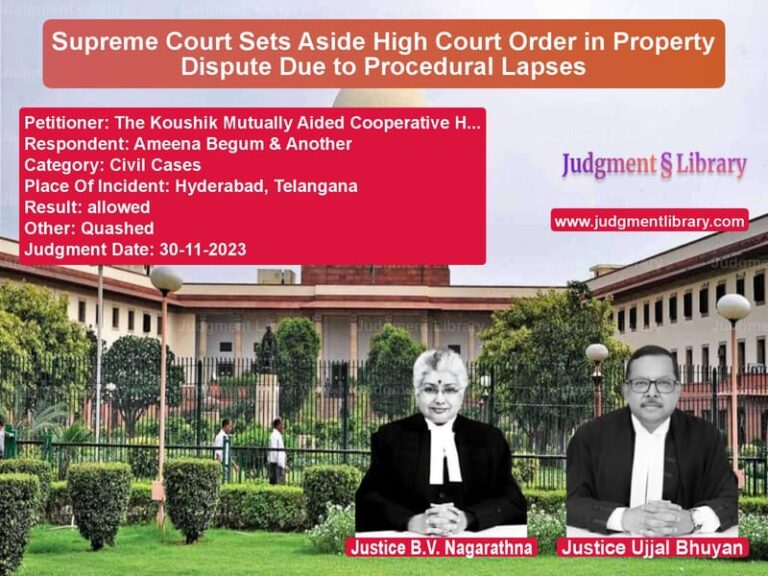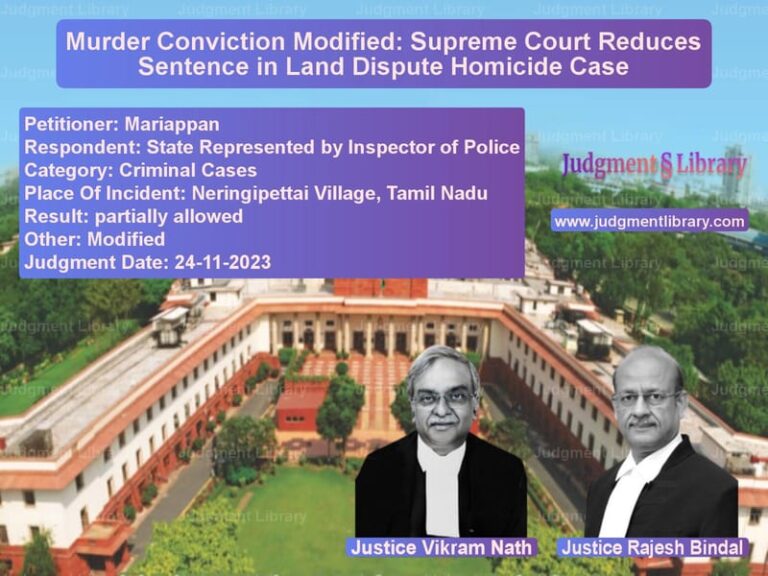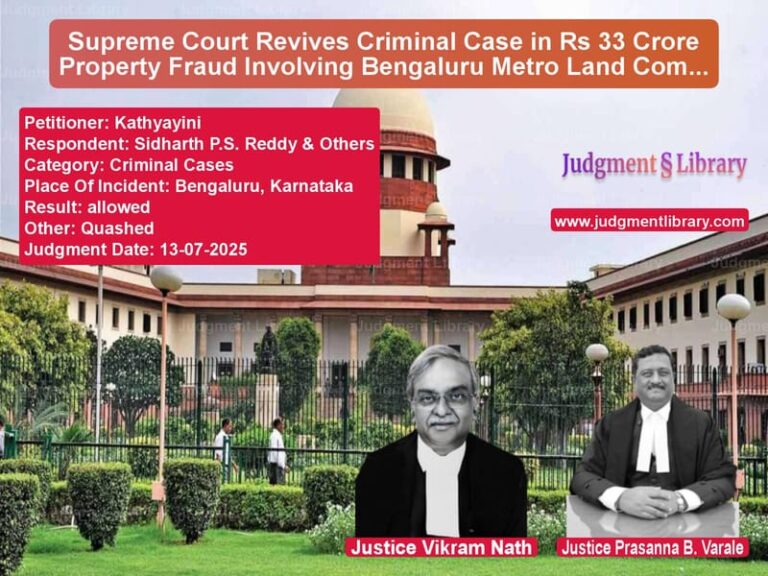Supreme Court Overturns High Court’s Suspension of Sentences in NDPS Cases
The case of State of Punjab v. Rakesh Kumar and other connected appeals is a landmark judgment that addresses a critical issue under the Narcotic Drugs and Psychotropic Substances Act, 1985 (NDPS Act). The case came before the Supreme Court after the Punjab and Haryana High Court granted suspension of sentences to several individuals convicted under the NDPS Act for possessing large quantities of manufactured drugs. The Supreme Court overturned the High Court’s decision, ruling that the NDPS Act applied to such cases and directed the authorities to take the accused back into custody.
Background of the Case
The appeals arose out of a series of cases where the accused individuals were found in possession of large quantities of narcotic and psychotropic substances without proper authorization. They were convicted under Sections 21 and 22 of the NDPS Act, which prescribe stringent penalties for the illegal possession and trafficking of such substances.
The High Court of Punjab and Haryana, in a common order dated January 29, 2018, suspended the sentences of these convicts while their appeals were pending. The High Court reasoned that since the seized substances were manufactured drugs, the case should be governed by the Drugs and Cosmetics Act, 1940 instead of the NDPS Act.
The State of Punjab, aggrieved by this order, approached the Supreme Court, arguing that the High Court had erred in law by undermining the application of the NDPS Act to cases involving large-scale possession of narcotic substances.
Prosecution’s Case
The State of Punjab, represented by its counsel, argued before the Supreme Court that:
- The High Court had erroneously applied the Drugs and Cosmetics Act instead of the NDPS Act.
- The accused were found in possession of psychotropic substances in commercial quantities, making them liable under the NDPS Act.
- The High Court’s decision set a dangerous precedent by allowing convicted individuals to secure bail despite the seriousness of the offenses.
- Previous rulings by the Supreme Court, such as Union of India v. Sanjeev V. Deshpande, made it clear that dealing with narcotic drugs and psychotropic substances was permissible only under stringent regulatory conditions for medical or scientific use.
- The NDPS Act contained a clear prohibition against the unauthorized possession, sale, and transport of narcotic substances.
Defense’s Arguments
The defense counsel, representing the accused, countered by arguing that:
- The seized drugs were manufactured and should be regulated under the Drugs and Cosmetics Act rather than the NDPS Act.
- The High Court had correctly ruled that the conviction under the NDPS Act was improper.
- The accused had been incarcerated for a long time while their appeals were pending, justifying the suspension of their sentences.
Supreme Court’s Observations
The Supreme Court carefully examined the provisions of both the NDPS Act and the Drugs and Cosmetics Act. It made the following critical observations:
- The NDPS Act explicitly prohibits the possession of narcotic drugs and psychotropic substances unless they are intended for authorized medical or scientific use.
- The Drugs and Cosmetics Act primarily regulates the quality, manufacture, and sale of pharmaceutical products, but does not override the NDPS Act.
- Section 80 of the NDPS Act explicitly states that its provisions operate in addition to, and not in derogation of, the Drugs and Cosmetics Act.
- High Courts do not have the discretion to disregard the legislative framework established by the NDPS Act by erroneously applying another statute.
The Supreme Court categorically ruled:
“The NDPS Act deals with a specific category of drugs, and its provisions operate in addition to those of the Drugs and Cosmetics Act. The High Court erred in suspending the sentence of the accused on the presumption that the case fell under the latter Act.”
Supreme Court’s Ruling
After thoroughly examining the case, the Supreme Court ruled that:
- The High Court had exceeded its jurisdiction by suspending the sentences of individuals convicted under the NDPS Act.
- The accused must be immediately taken back into custody.
- The High Court should expedite the appeals and adjudicate them without unnecessary delays.
- Observations in the present judgment should not prejudice the final decision in the pending appeals.
In its concluding remarks, the Supreme Court emphasized:
“The trial courts, after analyzing the evidence, found the accused guilty beyond reasonable doubt under Sections 21 and 22 of the NDPS Act. The High Court’s interference in suspending these sentences was unwarranted.”
Analysis of the Judgment
The Supreme Court’s ruling reaffirms the strict approach India takes towards drug-related offenses. Key takeaways from the judgment include:
- Strict enforcement of the NDPS Act: The ruling clarifies that courts cannot circumvent the provisions of the NDPS Act by applying the Drugs and Cosmetics Act.
- Clarity on sentencing in drug-related offenses: The judgment reinforces that sentencing under the NDPS Act must be carried out in accordance with legal provisions and cannot be arbitrarily suspended.
- Judicial restraint in modifying statutory penalties: The Supreme Court reiterated that High Courts should not grant relief that effectively nullifies the intent of the legislature in enacting stringent anti-drug laws.
Impact of the Judgment
This ruling is a significant precedent in the judicial interpretation of drug-related laws. The following points highlight its impact:
- Strengthening of drug control laws: The judgment underscores the necessity of upholding the strict provisions of the NDPS Act in cases of drug trafficking and possession.
- Judicial consistency: The decision ensures uniformity in the application of drug laws and prevents lower courts from deviating from statutory mandates.
- Protection of public interest: By overturning the suspension of sentences, the Supreme Court reinforced the need to curb drug-related crimes through stringent legal enforcement.
Conclusion
The Supreme Court’s decision in State of Punjab v. Rakesh Kumar is a crucial ruling that upholds the integrity of the NDPS Act. By setting aside the High Court’s suspension of sentences, the Court reaffirmed the principle that narcotic drug laws must be applied strictly and uniformly. The judgment also serves as a reminder that lower courts must exercise judicial discretion within the confines of established legal principles.
This ruling will serve as a guiding precedent for future cases involving the NDPS Act, ensuring that the judiciary maintains a firm stance on drug-related offenses while preventing any dilution of the law.
Petitioner Name: State of Punjab.Respondent Name: Rakesh Kumar.Judgment By: Justice N.V. Ramana, Justice Mohan M. Shantanagoudar, Justice M.R. Shah.Place Of Incident: Punjab.Judgment Date: 03-12-2018.
Don’t miss out on the full details! Download the complete judgment in PDF format below and gain valuable insights instantly!
Download Judgment: State of Punjab vs Rakesh Kumar Supreme Court of India Judgment Dated 03-12-2018.pdf
Direct Downlaod Judgment: Direct downlaod this Judgment
See all petitions in Drug Possession Cases
See all petitions in Bail and Anticipatory Bail
See all petitions in Judgment by N.V. Ramana
See all petitions in Judgment by Mohan M. Shantanagoudar
See all petitions in Judgment by Mukeshkumar Rasikbhai Shah
See all petitions in allowed
See all petitions in Quashed
See all petitions in supreme court of India judgments December 2018
See all petitions in 2018 judgments
See all posts in Criminal Cases Category
See all allowed petitions in Criminal Cases Category
See all Dismissed petitions in Criminal Cases Category
See all partially allowed petitions in Criminal Cases Category







